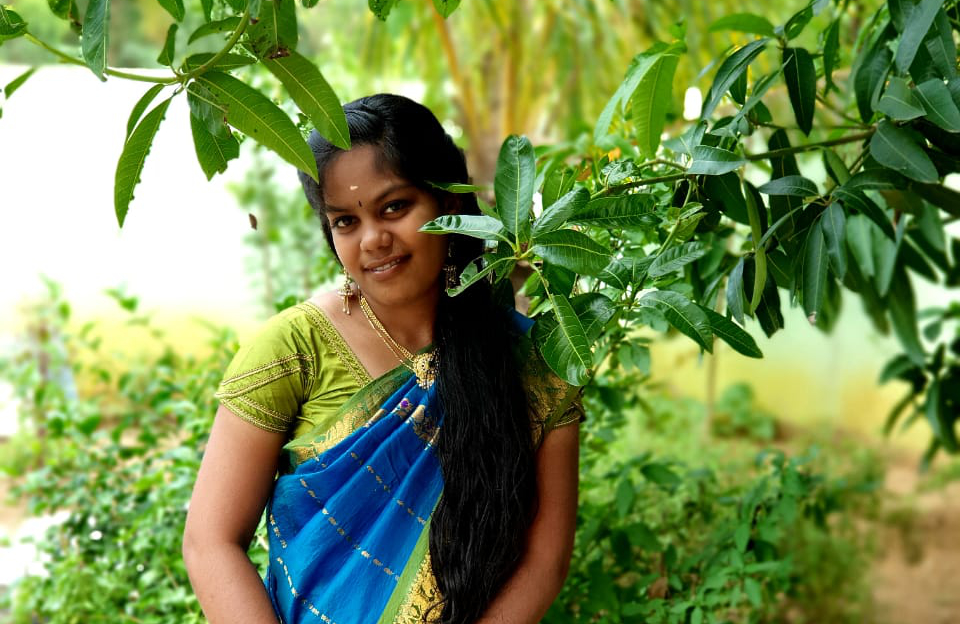Men and boys must help end our indignities around menstruation
- Soudarya Baskaran
|
Soundarya is a college student studying mathematics at the Perambalur Srinivasan College of Arts and Science in Venmankondan village, Ariyalur district, Tamilnadu. Her father S. Baskaran has been working as Consultant Engineer, Ministry of Electricity and Water, Kuwait and mother B.Dhanalakshmi is Headmistress in one of the Government Schools in Tamilnadu. Soundarya wrote a wonderful article at the United Nations. She has got great praise and congratulations from Asia Pacific Region of UN Women’s Organization. Instead of just writing this article as a woman, she took some action, realized and explored local issues. This is an article about women's menstrual problems. |
In my house in southern India, during my menstrual period my mother and grandmother impose restrictions on my cooking, work, bathing, worshipping, and diet. They ask me to wear a menstrual cloth that is to be reused or buried. The cloth must be washed and dried secretly or in a corner, unseen by others.
Things should not be like this more than a quarter-century after the adoption of the Beijing Declaration and Platform for Action. According to the Global Menstrual Health and Hygiene Collective, the 2019 review of the declaration highlighted the importance of taking action against menstrual stigma and providing proper sanitation for menstrual hygiene.
Women like me must suffer all this because of cultural beliefs.
People here believe that menstrual fluids may be used for black magic, so women should wash the menstrual cloth only at night while others were asleep. They see menstrual flow as dirty, polluting and shameful, so women hide the menstrual cloth for fear of being cursed. People link menstrual waste with witchcraft and danger, so women must bury the cloth or else the witches seeking human blood will find it and make the women infertile. Even touching a menstruating girl is considered toxic, so she is prohibited from cooking or participating in religious activities, or being in contact with religious articles. Menstruating women are not allowed to use regular water and sanitation facilities and, in some cases, even excluded from their homes.
As a result of all this, women feel subnormal, diseased, traumatized.
All this hurts me and I want to get rid of it in the community. I have approached members of self-help groups in my village and two neighboring villages and have seen that they are facing the same difficulties that I face in my household. So, I did research on the internet, in newspapers and magazines and on the UN Women website, and have been teaching proper menstrual hygiene to the self-help groups.
But we need men and boys to help solve the problem.
Gender inequality is one of the main reasons menstruation is a taboo topic and menstruation hygiene is neglected in villages like me. Women’s voices are ignored in households and communities and in development programmes. So we need comprehensive programmes that engage both men and women to understand best practices around menstrual hygiene.
Men and boys should support us in managing menstruation and hygiene in households, schools, workplaces and communities. But many men never even discuss the topic with their wives and daughters. They do not give them money to buy commercial sanitary pads, tampons and menstrual cups as they consider this an unnecessary expense. In low-income households, most women have to rely on cheap cloth pads which they have to use again. They find it difficult to clean and change menstrual materials in privacy. Those who have toilets at home feel embarrassed as the drain that leads out is not covered and there is a chance other will see blood flowing out the drain.
By engaging men and boys in group discussions and community meetings, we can change their perceptions and make them aware that they have a role in menstrual hygiene management.
Men and boys should support women and girls by constructing toilets, incinerators and latrines with chutes in homes, schools and communities. In households they should provide toilet facilities with privacy, water and soap, and they should regard menstrual hygiene products as a necessary expense. They can help women move freely and lower their risk of infections caused by unhygienic menstrual practices.
Policymakers should provide sanitary materials for free or at subsidized prices, along with water and sanitation facilities. And they should conduct seminars and workshops in rural areas so people can understand the problem women and girls face.
- Compiled by Arif Maricar
***************





